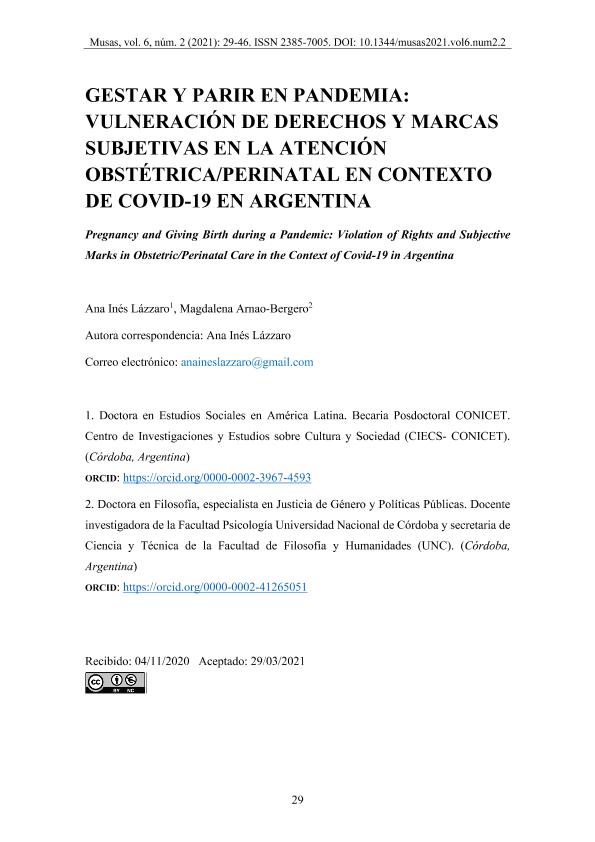Mostrar el registro sencillo del ítem
dc.contributor.author
Lazzaro, Ana Ines

dc.contributor.author
Arnao Bergero, Magdalena Agueda

dc.date.available
2021-10-15T17:18:59Z
dc.date.issued
2021-07
dc.identifier.citation
Lazzaro, Ana Ines; Arnao Bergero, Magdalena Agueda; Gestar y parir en pandemia: vulneración de derechos y marcas subjetivas en la atención obstétrica/perinatal en contexto de COVID-19 en Argentina; Universitat de Barcelona; Musas; 6; 2; 7-2021; 29-46
dc.identifier.uri
http://hdl.handle.net/11336/143875
dc.description.abstract
OBJETIVO. Durante la emergencia sanitaria por COVID-19 la atención en torno a embarazos y partos se vio directamente afectada. Este estudio exploratorio indaga sobre las percepciones, emociones y vivencias de las personas gestantes en relación con la atención obstétrica en instituciones de salud de Argentina en los primeros meses del aislamiento social en este país. MATERIAL Y MÉTODO. Los datos fueron obtenidos mediante un cuestionario semiestructurado dirigido a personas gestantes y/o que hubieran parido desde el comienzo de la cuarentena. Para este artículo, nos basamos en el apartado cualitativo del mismo a partir del análisis de tres preguntas abiertas que apuntaban a registrar los efectos subjetivos de atravesar la gestación y/o parto durante la emergencia sanitaria. El enfoque teórico retoma los desarrollos en materia de derechos perinatales desde una perspectiva de género y estudios sociales sobre violencia obstétrica. RESULTADOS Y CONCLUSIONES. Se advierte la insistencia de emociones negativas y malestar por parte de la población encuestada, entendidos como «marcas subjetivas». Asimismo, se pone en relieve el estado de desinformación sobre protocolos de atención como factor clave para dicho malestar y el recrudecimiento en la vulneración de derechos perinatales (contemplados en marcos legislativos vigentes) como parte de los derechos sexuales y (no) reproductivos para todas las personas gestantes y con capacidad de gestar.
dc.description.abstract
GOAL. This study explores the perceptions, emotions and experiences of pregnant women in relation to obstetric care in health institutions in Argentina in the first months of social isolation in this country. METHODOLOGY. The data were collected by means of a semi-structured questionnaire directed to pregnant people and those who had given birth since the beginning of the quarantine. For this article, we focused on the qualitative section of the survey analyzing three open questions that aimed to register the subjective effects of going through pregnancy and delivery during the health emergency. Our theoretical approach takes up the developments in perinatal rights from a gender perspective and social studies on obstetric violence. RESULTS AND CONCLUSIONS. The results show the high frequency of stressful emotions and discomfort from the surveyed population, analyzed in terms of effects on the subjectivity. Likewise, it is very noticeable the state of misinformation about perinatal care protocols, as well as the worsening in the violation of perinatal rights (contemplated in current normative frameworks) as part of sexual and (non) reproductive rights for all pregnant people and with ability to gestate.
dc.format
application/pdf
dc.language.iso
spa
dc.publisher
Universitat de Barcelona
dc.rights
info:eu-repo/semantics/openAccess
dc.rights.uri
https://creativecommons.org/licenses/by-nc/2.5/ar/
dc.subject
DERECHOS PERINATALES
dc.subject
COVID-19
dc.subject
EMERGENCIA SANITARIA
dc.subject
VIOLENCIA OBSTETRICA
dc.subject.classification
Ciencias Sociales Interdisciplinarias

dc.subject.classification
Otras Ciencias Sociales

dc.subject.classification
CIENCIAS SOCIALES

dc.title
Gestar y parir en pandemia: vulneración de derechos y marcas subjetivas en la atención obstétrica/perinatal en contexto de COVID-19 en Argentina
dc.title
Pregnancy and Giving Birth during a Pandemic: Violation of Rights and Subjective Marks in Obstetric/Perinatal Care in the Context of Covid-19 in Argentina
dc.type
info:eu-repo/semantics/article
dc.type
info:ar-repo/semantics/artículo
dc.type
info:eu-repo/semantics/publishedVersion
dc.date.updated
2021-10-15T17:13:03Z
dc.identifier.eissn
2385-7005
dc.journal.volume
6
dc.journal.number
2
dc.journal.pagination
29-46
dc.journal.pais
España

dc.journal.ciudad
Barcelona
dc.description.fil
Fil: Lazzaro, Ana Ines. Consejo Nacional de Investigaciones Científicas y Técnicas. Centro Científico Tecnológico Conicet - Córdoba. Centro de Investigaciones y Estudios sobre Cultura y Sociedad. Universidad Nacional de Córdoba. Centro de Investigaciones y Estudios sobre Cultura y Sociedad; Argentina
dc.description.fil
Fil: Arnao Bergero, Magdalena Agueda. Consejo Nacional de Investigaciones Científicas y Técnicas. Centro Científico Tecnológico Conicet - Córdoba. Instituto de Antropología de Córdoba. Universidad Nacional de Córdoba. Facultad de Filosofía y Humanidades. Instituto de Antropología de Córdoba; Argentina
dc.journal.title
Musas
dc.relation.alternativeid
info:eu-repo/semantics/altIdentifier/url/https://revistes.ub.edu/index.php/MUSAS/index
dc.relation.alternativeid
info:eu-repo/semantics/altIdentifier/doi/http://dx.doi.org/10.1344/musas2021.vol6.num2.2
Archivos asociados
